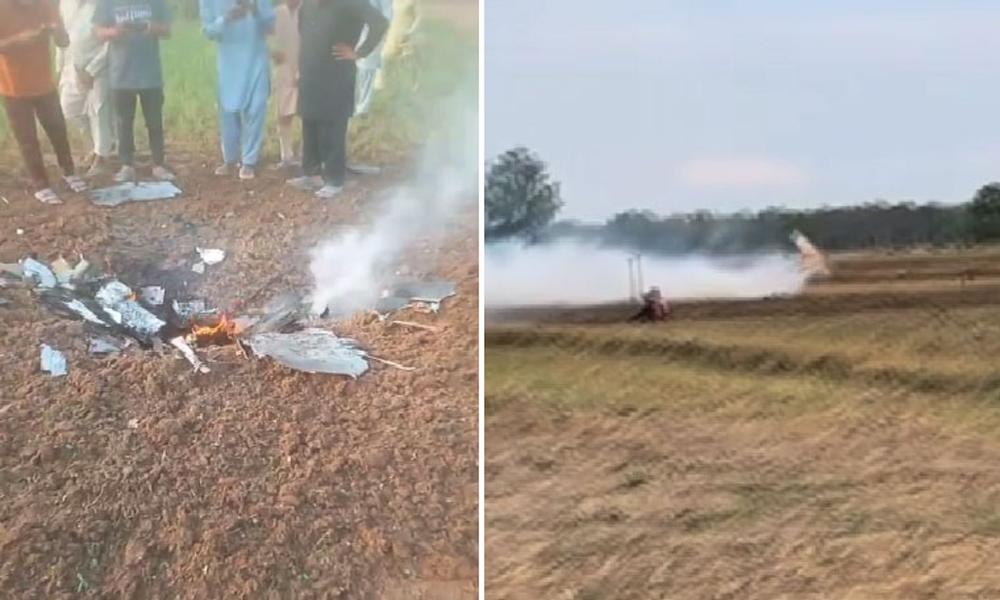SC proceeding live broadcast, hearing on petitions against Practice and Procedure Act
Chief Justice Qazi Faez Isa is presiding over the full court on the first court day.


Islamabad: For the first time in the country's history, the proceedings of Supreme Court are being broadcast live on Monday. The Supreme Court allowed petitions to constitute a full court on appeals against the Practice and Procedure Act in the apex court.
According to details, the Supreme Court is hearing the petitions against the Practice and Procedure Act under the chairmanship of Chief Justice of Pakistan (CJP) Qazi Faez Isa.
Today's hearing
During the hearing, Chief Justice Qazi Faez asked that there are nine applications and who are the lawyers? Mr. Khawaja Tariq Rahim, please start the arguments.
The Chief Justice of Pakistan said: “The arguments will start again as a new bench has been constituted, there were three appeals to form a full court which are being approved”.
Justice Qazi in his remarks said that in the full court meeting, it was approved to hold the full court hearing, people want us to decide 57,000 cases.
The CJP remarked that Khawaja Sahib (Khawaja Tariq Rahim) we do not ask you to speak less, but you should keep it concise, forget the past and talk about the present.
Justice Musarat Hilali inquired about Section 5 if it will not be exercised due to one party.
Lawyer Khawaja Tariq Rahim said the Supreme Court had made its rules through the full court, but the Parliament interfered in the rules of the Supreme Court.
Justice Athar Minallah inquired: “Mr. Khawaja, do you support what happened in the past? While the Chief Justice asked you to tell me whether the whole law was wrong or a few clauses”?
Khawaja Tariq Rahim replied that according to Schedule 4 of the Federal Legislative List, the Supreme Court makes its own rules of practice and procedure.
On which Justice Jamal Mandukhel asked whether this authority was given to the Supreme Court in the Constitution or in the law. Lawyer Khawaja Tariq Rahim stated: “I am noting the questions and will answer them later”.
Justice Qazi Faez added that Mr. Khawaja should only read the constitutional clauses and not interpret them. While Justice Athar Minallah asked what are you saying, Mr. Khawaja was not the scope or power of Parliament to make this law.
Chief Justice of Pakistan while talking to Khawaja Tariq Rahim said, Mr. Khawaja, bring a separate petition for what you are talking about. Focus on your current application, I want to make things easy for you, but it seems that you are like that.
Justice Athar Minallah remarked that powers are not mentioned in the law while Chief Justice Qazi Faez Isa said that Supreme Court has its own authority to exercise its powers, do you think Supreme Court Rules 1980 are in conflict with the Constitution? Don't talk about the future, limit the arguments to the present and file a petition for future legislation.
Justice Muneeb Akhtar stated that Article 184/3 is judicial power, an attempt was made to prevent the court from exercising its powers.
Justice Mansoor Ali Shah asked what is your argument Mr. Khawaja? I have understood your point that if all this is done by the full court then it is right, if the Parliament does this work then it is wrong, I have understood this from your point.
Justice Musarrat Hilali inquired whether the powers of Chief Justice can be neutralized through legislation.
While Justice Jamal Mandukhel asked whether the powers of Chief Justice were abolished by the legislation or the powers of the Supreme Court?
Lawyer Khawaja Tariq said: “The provision of a bench of at least five judges in constitutional cases has also been included in the legislation, on which Justice Qazi Faez Isa said that the provision you object to, say I object to it”.
Justice Athar Minallah asked Khawaja Tariq if Chief Justice has unlimited power to form a bench. While Justice Muhammad Ali Mazhar inquired, please tell me which article of the constitution the act is in conflict with?
During the hearing, Justice Muneeb Akhtar said that Parliament says that less than five judges cannot hear a case, what will happen if Parliament says that seven judges will not hear a case? In the United States, the issue of the right of abortion has become a problem, it is the Supreme Court whose job is to defend the Constitution.
The Chief Justice of Pakistan said: “I was not satisfied with your arguments,” while Justice Athar Minallah said the independence of the judiciary should not only be external but also internal. It is implicit to have the option.
Justice Mansoor Ali Shah stated that in foreign countries benches are formed by ballot. The chief does not even have the idea of power to form a bench.
Petitioner's lawyer Imtiaz Siddiqui said the Practice and Procedure Act of Parliament is unconstitutional. On which Justice Muhammad Ali Mazhar said that according to Article 141, Parliament can make laws.
Lawyer Imtiaz Siddiqui said Parliament is interfering in the internal affairs of the Supreme Court, on which Justice Mansoor Ali Shah replied, “You tell us if there can be any law that regulates the judiciary”.
Imtiaz Siddiqui added that no law can be made directly related to judicial jurisdiction and powers, Parliament can only recommend a matter to the judiciary through a supplementary law.
Justice Muneeb Akhtar remarked that it is Supreme Court whose job is to defend the Constitution, every law made is not enforceable, while Justice Athar Minullah said the Supreme Court is a constitutional institution, so is it not Parliament?
Chief Justice Qazi Isa asked where it is written that Supreme Court is above the law. There are two main points in this, what is written in this judgment is negating your argument, don't scare us, just give arguments.
The petitioner's lawyer, Imtiaz Siddiqui, said: “If I am not allowed to speak and will be ridiculed, then I am leaving, to which Justice Qazi Faiz Isa said you should think about the people,” Imtiaz Siddiqui replied that I am talking about the people. I have not been allowed to talk to its better that I leave.
The Chief Justice of Pakistan while talking to the petitioner's lawyer said if you want to go, then go, otherwise be limited to the current case. The revision appeal has increased the authority of the Supreme Court, this may also agree with your argument and reject the petition.
Chief Justice Qazi Faez Isa is presiding over the full court on the first court day. The full court comprising 15 judges of the Supreme Court is hearing Supreme Court Practice and Procedure Act.
The other judges of the full fourt include Justice Sardar Tariq Masood, Justice Ijaz-ul-Ahsan, Justice Syed Mansoor Ali Shah, Justice Muneeb Akhtar, Justice Yahya Afridi, Justice Amin-ud-din Khan, Justice Mazahir Ali Akbar Naqvi, Justice Jamal Khan Mandukhel, Justice Mohammad Ali Mazhar, Justice Ayesha A, Justice Athar Minullah, Justice Hasan Azhar Rizvi, Justice Musarat Hilali and Justice Shahid Waheed.
Watch now:
The federal government has submitted its written response against the Supreme Court Practice and Procedure Act to the court through the Attorney General, in which it has requested to reject the petitions against the Supreme Court Practice and Procedure Act.
An eight-member bench of the Supreme Court stayed the implementation of the Practice and Procedure Act on April 13.
The Supreme Court Practice and Procedure Act deals with the distribution of powers of the Chief Justice in cases of public interest.
According to the Practice and Procedure Act, the decision to take automatic notice will be taken by the Chief Justice and a committee consisting of two seniors.
It is pertinent to note that earlier on yesterday (Sunday), Justice Qazi Faez Isa took oath as the Chief Justice of Pakistan and after taking the oath, the first case scheduled for hearing was Supreme Court Practice and Procedure Act.
Earlier in April this year, Justice Qazi Faez had declined to be a part of the bench of any constitutional case, saying that he would not be a part of any bench until the Supreme Court Practice and Procedure Act petitions are decided.

She was arrested for an op-ed. Now a judge has ordered her freed.
- 23 minutes ago
Passenger bus catches fire near Kallar Kahar
- 21 minutes ago
Youm-e-Tashakkur: Nation offers prayers in tribute to military’s valor
- 2 hours ago

Punjab schools to reopen tomorrow after ceasefire between Pakistan and India
- 35 minutes ago

Google settles with Texas over unlawful data tracking for $1.375bn
- 2 hours ago

Taliban arrest 14 in Takhar for playing music and singing at night
- 2 hours ago
Bangladesh bans Awami League activities over national security concerns
- 2 hours ago
Former Australian cricketer Bob Cowper passes away at 84
- an hour ago

Sajid Sadpara climbs world’s 7th highest peak, Dhaulagiri, unassisted
- an hour ago

Trump offers to help resolve Kashmir dispute as Pakistan-India ceasefire holds
- an hour ago

Karachi braces for hot, humid day as temperature hits 36°C
- 27 minutes ago

What Pope Leo XIV’s history can tell us about his papacy
- 9 hours ago






